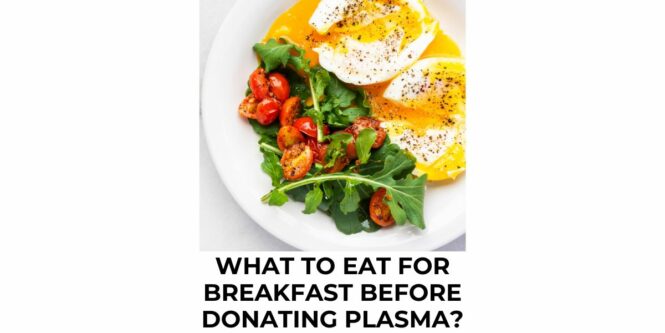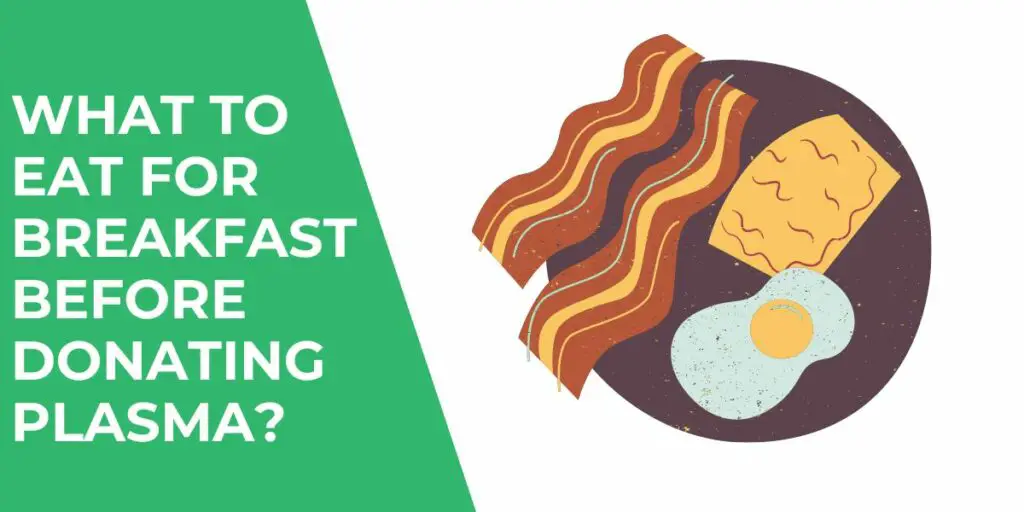
Donating plasma is a wonderful act of kindness, but do you often wonder What to Eat For Breakfast Before Donating Plasma?
Based on extensive research and practical experiences, it’s essential to fuel your body with specific proteins and iron-rich foods at least three hours before donation.
In this article, we’ll delve into the specifics of what constitutes an ideal pre-plasma-donation breakfast meal.
What to Eat For Breakfast Before Donating Plasma?

These are What to Eat For Breakfast Before Donating Plasma:
- Stay Hydrated: Begin your day with a glass of water. Dehydration can make it difficult for your body to recover after a plasma donation, so it’s important to drink plenty of fluids.
- Whole Grains: Opt for whole-grain cereals, oatmeal, or whole grain bread. Whole grains are a good source of iron and B-vitamins which are beneficial when donating plasma.
- Protein: Have a source of protein, such as eggs or Greek yogurt. Protein can help maintain your energy levels.
- Fruits: Fruits like bananas, oranges, or strawberries can be a good choice because they are rich in vitamins and can help keep you hydrated.
- Avoid Fatty Foods: Fatty foods can affect the plasma you donate. Try to limit your intake of high-fat foods like bacon, sausage, or butter.
- Avoid Alcohol: Alcohol can dehydrate you, which is not ideal when you’re preparing to donate plasma. Stick to non-alcoholic beverages like water, fresh fruit juice or herbal tea in the morning.
- Iron and Vitamin C: Foods rich in iron and Vitamin C can be beneficial. Iron is crucial for your blood, and Vitamin C can help your body absorb iron. Consider having a glass of orange juice, which is rich in vitamin C.
If you’re looking to streamline your plasma donation process and want to learn more, don’t forget to check our in-depth guide on Tips for Donating Plasma Faster.
List of Foods to Eat Before Donating Plasma
This is the list of foods to eat before donating plasma:
- Whole Grains: Foods like whole grain bread, brown rice, oatmeal, and whole grain pasta are good options as they are rich in iron and B vitamins.
- Lean Proteins: Foods like turkey, chicken, fish, and tofu can help to maintain your energy levels.
- Fruits: Opt for fruits rich in vitamin C to aid iron absorption, such as oranges, strawberries, and kiwi. Bananas can also be a good option for a quick energy boost.
- Vegetables: Dark, leafy green vegetables like spinach and broccoli are iron-rich and beneficial.
- Eggs: Eggs are a good source of protein and vitamin B12, which is important for blood health.
- Nuts and Seeds: Foods like almonds, sunflower seeds, and flax seeds are high in iron.
- Dairy: Low-fat milk, cheese, or yogurt can provide you with calcium and protein.
- Legumes: Foods like lentils, chickpeas, and beans are high in iron and fiber.
- Hydration: While not a food, it’s important to remember to drink plenty of water before and after your donation.
If you’re curious about how this plasma donation might interact with your fitness goals, you may find it beneficial to learn more about whether Donating Plasma Affects Muscle Growth.
Iron Rich Foods to Eat Before Donating Plasma
These are the top iron rich foods to eat before donating plasma:
- Lean Meats: Beef, chicken, and turkey are good sources of iron.
- Seafood: Shellfish, clams, and fish like tuna and salmon contain high levels of iron.
- Leafy Green Vegetables: Spinach, kale, and collard greens are packed with iron.
- Legumes: Foods like lentils, chickpeas, and beans are high in iron.
- Whole Grains: Foods like brown rice, oatmeal, and whole grain bread or pasta can be good sources of iron.
- Nuts and Seeds: Almonds, sunflower seeds, and flax seeds are also high in iron.
- Eggs: Particularly the yolks, are a good source of iron.
- Tofu: This is a great iron-rich option for vegetarians and vegans.
- Dried Fruits: Foods like raisins, prunes, and apricots have iron.
- Fortified Foods: Some foods are fortified with iron, such as certain cereals and breads. Check the label to be sure.
To better understand the process and requirements of plasma donation, you might also be interested in learning about one common procedure: Why Do They Check Your Elbows When Donating Plasma?
Can I Eat Eggs Before Donating Plasma?
Yes, you can eat eggs before donating plasma. Eggs are a great source of protein and contain essential vitamins, such as vitamin B12, which is beneficial for blood health.
Can I Eat 30 Minutes Before Donating Plasma?
Yes, you can eat 30 minutes before donating plasma, but it’s generally recommended to eat a meal 2-3 hours prior to your appointment. This allows your body to properly digest the food, helping you avoid any discomfort during the donation process.
Importance of Having a Nutritious Breakfast Before Donating Plasma
Having a Nutritious Breakfast Before Donating Plasma contributes significantly to producing healthy blood cells and hemoglobin – essential components required during plasma donation.
Things to Consider While Choosing Breakfast Before Plasma Donation
These are the Things to Consider While Choosing Breakfast Before Plasma Donation:
- Firstly, include protein in your meals. Items like eggs, beef, chicken, and shrimp are excellent sources of protein that will help replenish the blood components lost during donation.
- You should also add iron-rich foods to your breakfast like spinach, peas, or even sweet potatoes. Iron-rich foods play a vital role in boosting the production of hemoglobin which carries oxygen in our blood.
- Another factor to consider is timing; Have a hearty meal a few hours before you donate plasma instead of having an empty stomach which might cause lightheadedness during or after donation.
- Opt for complex carbohydrates such as oats and quinoa as they’re good for digestion and keep you feeling full longer.
- Less beneficial are sodium-rich and fatty foods which can affect plasma quality making it cloudy rather than clear- an indicator that fat molecules are present which interfere with the serum separation process; hence avoid pizzas, fried food items, sweets etc on the day of donation.
Foods that Interfere with Plasma Donation
Certain foods can interfere with plasma donation and may affect the quality of your donation. It is important to avoid these foods before donating plasma. Foods that are high in fat and sodium, such as fried foods, pizza, chips, candy, ice cream, and soda should be avoided on the day of donation.
These foods can lead to dehydration and make it difficult for your body to replenish fluids after donating plasma. Additionally, sugary snacks or drinks can cause your blood sugar levels to spike and then crash, which can leave you feeling lightheaded or faint during the donation process.
To ensure a successful plasma donation experience, it is best to stick with nutritious options that provide sustained energy without interfering with the donation process.
Nutrition Breakfast Options Suitable for Plasma Donation
These are the Nutrition Breakfast Options Suitable for Plasma Donation:
1. Eggs: Rich in protein and iron, eggs make for an excellent breakfast option before donating plasma.
2. Greek yogurt: Packed with protein, Greek yogurt is not only delicious but also provides essential nutrients for a successful donation.
3. Whole grain toast: Opt for whole grain bread over refined white bread as it contains more fiber and nutrients.
4. Oatmeal: A bowl of oatmeal topped with fruits and nuts is not only filling but also provides sustained energy throughout the day.
5. Spinach smoothie: Blend spinach, banana, almond milk, and a scoop of protein powder for a nutritious and easy-to-digest breakfast before donation.
Importance of Hydration Before Plasma Donation
Staying hydrated is crucial before donating plasma. Drinking enough water helps ensure that your body is well-prepared for the donation process. Hydration plays a key role in maintaining healthy blood flow and preventing dizziness or lightheadedness during and after plasma donation.
FAQs on What to Eat For Breakfast Before Donating Plasma
These are the most frequently asked questions on what to eat for breakfast before donating plasma:
What should I eat for breakfast before donating plasma?
It is recommended to eat a balanced meal that includes sources of protein, carbohydrates, and healthy fats.
Are there any foods to avoid before donating plasma?
Before donating plasma, it is best to avoid consuming fatty or greasy foods as they can affect the clarity of your plasma. It is also important to avoid caffeine and alcohol as they can dehydrate you.
How much time should I allow between eating breakfast and donating plasma?
It is generally recommended to wait at least 2 hours after eating a meal before donating plasma.
Can I drink water before donating plasma?
Yes, it is important to stay hydrated before donating plasma. However, be sure not to overhydrate as this may dilute your blood sample during testing.
How much water should I drink before donating plasma?
To ensure optimal hydration, it is recommended to drink at least 16 ounces of water or other non-alcoholic beverages before your plasma donation.
What type of food should I avoid before donating plasma?
Foods that are high in sodium and fat, such as French fries, pizza, chips, candy, ice cream, and soda should be avoided before donating plasma.
Conclusion
In conclusion, I hope you now know What to Eat For Breakfast Before Donating Plasma. Opting for protein and iron-rich foods like lean meats, eggs, and green leafy vegetables will ensure that you have enough nutrients in your system without interfering with the donation process.
Remember to hydrate properly before donation and avoid high sodium and fatty foods. By following these guidelines, you can have a healthy breakfast that sets you up for a successful plasma donation.

